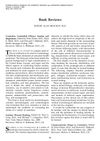 2 citations,
January 2015 in “Springer eBooks”
2 citations,
January 2015 in “Springer eBooks” Environmental factors and exposure to toxins may contribute to male infertility by affecting sperm and hormone function.
 5 citations,
May 2021 in “International Journal of Cosmetic Science”
5 citations,
May 2021 in “International Journal of Cosmetic Science” Healthy scalp leads to better hair quality and less damage.
 65 citations,
May 2010 in “Current Women's Health Reviews”
65 citations,
May 2010 in “Current Women's Health Reviews” Oxidative stress is a key factor in the development of Polycystic Ovary Syndrome, and weight management can improve symptoms.
 January 2023 in “Applied sciences”
January 2023 in “Applied sciences” Gefitinib and Sasam-Kyeongokgo together significantly reduce cancer growth and improve immune response in mice.
 January 2020 in “Asian journal of applied science and technology”
January 2020 in “Asian journal of applied science and technology” Good nutrition is crucial for health and preventing disease, and supplements can help prevent nutrient deficiencies.
 22 citations,
November 2014 in “Psychiatric Clinics of North America”
22 citations,
November 2014 in “Psychiatric Clinics of North America” Stress can worsen skin conditions and affect mental health, so doctors should include stress management in skin treatment.
 10 citations,
January 2021 in “Journal of Ginseng Research”
10 citations,
January 2021 in “Journal of Ginseng Research” Red ginseng oil may help grow hair and protect skin from UVC light.
 April 2016 in “Plastic and reconstructive surgery. Global open”
April 2016 in “Plastic and reconstructive surgery. Global open” The supplement highlighted advancements and challenges in plastic and reconstructive surgery, including the impact of smoking, chemotherapy, and new treatments like Tafluprost for hair loss.
 26 citations,
October 2007 in “Experimental Dermatology”
26 citations,
October 2007 in “Experimental Dermatology” L-Carnitine-L-tartrate may help hair grow and prevent hair loss.
 6 citations,
August 2017 in “Physiological Research”
6 citations,
August 2017 in “Physiological Research” Setipiprant may reduce inflammation by blocking an enzyme called aldose reductase.
 March 2001 in “International Journal of Cosmetic Surgery and Aesthetic Dermatology”
March 2001 in “International Journal of Cosmetic Surgery and Aesthetic Dermatology” The document covers books on cosmetic surgery and skin care, discussing legal and ethical issues, wound healing, the overlap of cosmetics and drugs, and detailed plastic surgery techniques.
 4 citations,
October 2022 in “Frontiers in public health”
4 citations,
October 2022 in “Frontiers in public health” Cadmium chloride pollution can cause skin disorders, speed up aging, and prevent hair growth.
 10 citations,
May 2020 in “Dermatology Research and Practice”
10 citations,
May 2020 in “Dermatology Research and Practice” Proteoglycans are important for hair growth, and a specific treatment can help reduce hair loss.
 14 citations,
April 2005 in “Experimental Dermatology”
14 citations,
April 2005 in “Experimental Dermatology” Stressed fibroblasts greatly increase melanin production in hair, skin, and eye cells, mainly due to a growth factor called bFGF.
52 citations,
May 2011 in “APOPTOSIS” Hydroxyl radicals cause hair follicle cell death during chemotherapy by reducing Bcl-2 protein levels.
1 citations,
January 2023 in “Chemical Engineering Journal”  January 2024 in “GeroScience”
January 2024 in “GeroScience” Using radiation to make mice's hair turn gray helps study and find ways to prevent or reverse hair graying.
 45 citations,
February 2018 in “Journal of basic and clinical physiology and pharmacology/Journal of basic & clinical physiology & pharmacology”
45 citations,
February 2018 in “Journal of basic and clinical physiology and pharmacology/Journal of basic & clinical physiology & pharmacology” *Acorus calamus* has many medicinal benefits but needs more safety research.
 7 citations,
January 2022 in “Animal Reproduction”
7 citations,
January 2022 in “Animal Reproduction” Using rodents for research shows that health problems in the womb can cause diseases later in life.
 9 citations,
April 2016 in “Cutaneous and ocular toxicology”
9 citations,
April 2016 in “Cutaneous and ocular toxicology” Alpha Lipoic Acid helps protect skin from smoking damage.
 2 citations,
November 2017 in “Gynecological Endocrinology”
2 citations,
November 2017 in “Gynecological Endocrinology” The enzyme myo-inositol oxygenase is not linked to the cause of polycystic ovarian syndrome.
 2 citations,
March 2017 in “Asian Journal of Beauty and Cosmetology”
2 citations,
March 2017 in “Asian Journal of Beauty and Cosmetology” Caffeic acid protects human scalp cells from UV damage.
 84 citations,
April 2005 in “Dermatologic Clinics”
84 citations,
April 2005 in “Dermatologic Clinics” Treatments for melanin disorders exist, but more effective options needed.
 1 citations,
June 2019 in “Food Research”
1 citations,
June 2019 in “Food Research” Tempeh oil rich in linoleic acid may protect against skin aging caused by UV light.
 17 citations,
February 2013 in “PLOS ONE”
17 citations,
February 2013 in “PLOS ONE” 6-Gingerol, found in ginger, may slow down hair growth and could be used for hair removal.
 20 citations,
February 2017 in “International Journal of Dermatology”
20 citations,
February 2017 in “International Journal of Dermatology” Honokiol helps protect skin from damage and aging caused by cigarette smoke.
 120 citations,
February 2009 in “Apoptosis”
120 citations,
February 2009 in “Apoptosis” Understanding how cells die in the skin is important for treating skin diseases and preventing hair loss.
 5 citations,
May 2020 in “Diagnostics”
5 citations,
May 2020 in “Diagnostics” Lower zinc levels may predict less effective hair loss treatment.
 125 citations,
May 2019 in “Phytomedicine”
125 citations,
May 2019 in “Phytomedicine” Cepharanthine is a well-tolerated drug with multiple medical uses, including anti-inflammatory and anti-cancer properties.
 295 citations,
March 2016 in “Life Sciences”
295 citations,
March 2016 in “Life Sciences” Air pollution worsens skin diseases and aging by causing inflammation and oxidative stress.




























